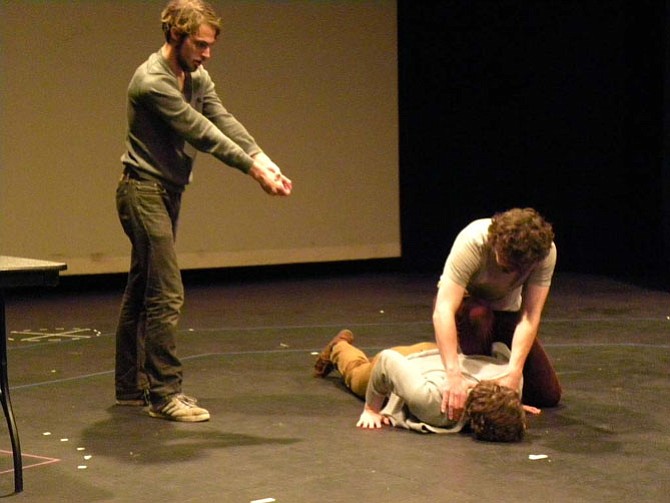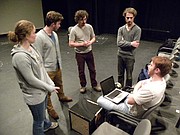From left, Brandon Herlig, Sam Taylor and Eric Schlein rehearse the fight scene in Aaron Sulkin’s “Uniform,” which will be shown on Tuesday, Nov. 11 at the Johnson Center Cinema in Fairfax. Photos by Abigail Constantino/The Connection
Playwright Aaron Sulkin narrowed his eyes as he watched scenes he wants the cast to repeat during rehearsal of his play “Uniform” to be featured in Mason Hillel’s Expressions of the Holocaust, Storytellers on Tuesday, Nov. 11 at George Mason University’s Johnson Center Cinema in Fairfax.
He called out “Hold” to stop the rehearsal and often consulted with the cast--Caty Bensen, Brandon Herlig, Eric Schlein and Sam Taylor. “Does that feel weird?” he would ask the actors, when he saw a scene he felt needed to be performed differently. Bensen replaces Brittany Martz, who played the role of Zsuzsanna at the Capital Fringe Festival last July.
The rehearsal is collaborative between Sulkin and the cast. As the actors delved into the play, Sulkin remained silent, watching intently. The intensity of “Uniform”--a story about three Jewish siblings hiding in Hungary and the decision they have to make to trust a Nazi officer help them escape--becomes evident during these uninterrupted segments. “That’s so good,” Sulkin said, at the end of a pivotal scene.
Sulkin got the inspiration for his play two years ago, while a student at George Mason University, from his encounter at Temple Beth Torah, in Chantilly, with Kenneth Fried’s father, a Holocaust survivor. He also wanted to write about people and their behavior when they have to make difficult choices--a “real picture of humanity in a really, really extreme situation,” said Sulkin.
The three siblings have to make the difficult decision whether to trust Erik, the Nazi officer, who has promised to help them. However, Erik also has to make a decision to help the siblings or turn against them. Coloring each character’s choices are issues of trust and loss.
Taylor, who plays Erik the Nazi officer, said that he would believe his character. “He’s quite persuasive and I think I would follow him,” he said.
Ambiguity is an undisguised mechanism of the play. No one is really good or bad, said Sulkin. “Everyone is kind of the same, forced into this horrible circumstance.”
“Arts have a way to communicate things that other ways maybe don’t to some people,” said Laura Fargotstein, a member of the community committee at Mason Hillel. “It’s important to have events like [Expressions] to keep what happened in the forefront of people’s minds, to feel it in their bones, to hear personal stories,” she said.
Expressions of the Holocaust, Storytellers will feature Sulkin’s play, a documentary, and a panel of Holocaust survivors. Admission is free to George Mason students, and costs $36 to the public. For more information, visit http://hillel.gmu.edu/2014/10/05/expressions/.

